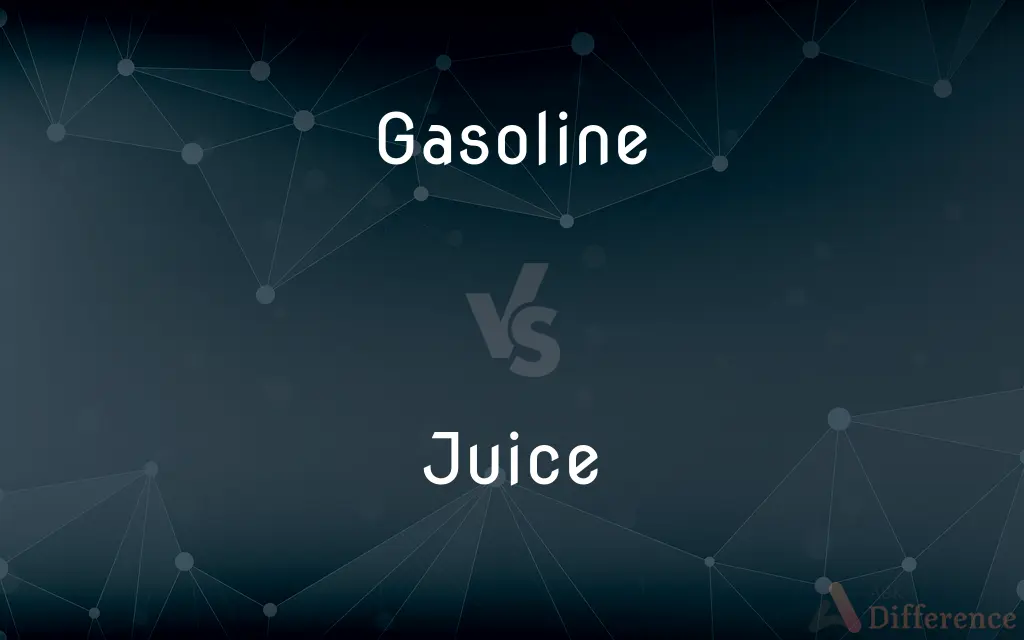Gasoline vs. Juice — What's the Difference?
Edited by Tayyaba Rehman — By Urooj Arif — Updated on April 23, 2024
Gasoline is a fossil fuel used primarily for powering engines, while juice is a liquid extracted from fruits or vegetables, consumed as a beverage.

Difference Between Gasoline and Juice
Table of Contents
ADVERTISEMENT
Key Differences
Gasoline is derived from crude oil through a refining process and is used primarily as a fuel in internal combustion engines. Whereas, juice is obtained by mechanically squeezing or macerating fresh fruits or vegetables without the application of heat or solvents.
The main purpose of gasoline is to act as an energy source for vehicles and machinery, enabling combustion to release energy that powers engines. On the other hand, juice serves as a source of hydration, vitamins, and minerals, contributing to nutritional intake.
Gasoline emits pollutants and greenhouse gases when burned, contributing to environmental issues like air pollution and climate change. Juice production, while having some environmental impact due to farming and packaging, generally has a significantly lower carbon footprint.
The storage and handling of gasoline require careful safety measures due to its highly flammable nature and toxic fumes. Juice, however, requires refrigeration to maintain freshness but poses no significant safety risks under normal conditions.
Economic factors also differentiate them; the price of gasoline is heavily influenced by global oil markets and geopolitical factors, while juice prices are affected by agricultural conditions, such as crop yields and seasonal variations.
ADVERTISEMENT
Comparison Chart
Source
Derived from crude oil.
Extracted from fruits and vegetables.
Primary Use
Fuel for internal combustion engines.
Beverage for consumption.
Environmental Impact
High, emits pollutants and greenhouse gases.
Lower, but involves agricultural impacts.
Safety Risks
Highly flammable, toxic fumes.
Generally safe, spoilage is main concern.
Price Influences
Global oil markets, geopolitics.
Agricultural conditions, seasonal variations.
Compare with Definitions
Gasoline
A volatile fuel derived from petroleum, used mainly in internal combustion engines.
Gasoline prices fluctuate often, affected by international events.
Juice
A drink made from the extraction or pressing of the natural liquid contained in fruit and vegetables.
Orange juice is a popular breakfast beverage.
Gasoline
Essential for the operation of most cars, motorcycles, and small engines.
The car requires unleaded gasoline for optimal performance.
Juice
Can be consumed fresh, pasteurized, or as a concentrate.
Some prefer freshly squeezed juice for more natural flavor.
Gasoline
Subject to environmental regulations due to its impact on air quality.
Reformulated gasoline reduces emissions and protects air quality.
Juice
A source of hydration and dietary fiber, especially if the pulp is included.
Drinking apple juice with pulp increases fiber intake.
Gasoline
It is composed of a complex mixture of hydrocarbons.
The efficiency of gasoline depends on its octane rating.
Juice
Often fortified with vitamins like vitamin C or D for added health benefits.
Many brands of juice add extra vitamin C to prevent spoilage and boost nutritional content.
Gasoline
Stored in tanks and requires careful handling due to its flammability.
Always turn off the engine when refueling with gasoline.
Juice
Fruit juices have natural sugars; some have added sugars or sweeteners.
Check the label to see if the juice has added sugars.
Gasoline
Gasoline () or petrol () (see the etymology for naming differences and the use of the term gas) is a transparent, petroleum-derived flammable liquid that is used primarily as a fuel in most spark-ignited internal combustion engines. It consists mostly of organic compounds obtained by the fractional distillation of petroleum, enhanced with a variety of additives.
Juice
Juice is a drink made from the extraction or pressing of the natural liquid contained in fruit and vegetables. It can also refer to liquids that are flavored with concentrate or other biological food sources, such as meat or seafood, such as clam juice.
Gasoline
A volatile mixture of flammable liquid hydrocarbons derived chiefly from crude petroleum and used principally as a fuel for internal-combustion engines.
Juice
A fluid naturally contained in plant or animal tissue
Fruit juice.
Meat braised in its own juices.
Gasoline
A flammable liquid consisting of a mixture of refined petroleum hydrocarbons, mainly used as a motor fuel; petrol.
Juice
A bodily secretion
Digestive juices.
Gasoline
(countable) Any specific kind of gasoline.
The refinery produces a wide range of gasolines.
Juice
The liquid contained in something that is chiefly solid.
Gasoline
Marijuana, especially very potent or high quality.
Juice
A beverage made from fruit juice or fruit-flavored syrup that is often combined with sweeteners, water, or other ingredients.
Gasoline
(slang) An alcoholic beverage made of vodka and energy drink.
Juice
A substance or quality that imparts identity and vitality; essence.
Gasoline
Made from or using gasoline.
Juice
(Slang) Vigorous life; vitality.
Gasoline
A highly volatile mixture of fluid hydrocarbons, obtained mostly from petroleum, as also by the distillation of bituminous coal. It is used as a fuel for most automobiles and for many other vehicles with internal combustion engines. The gasoline of commerce is typically blended with additives to improve its performance in internal combustion engines. Gasoline was also used in the early 1900's in making air gas, and in giving illuminating power to water gas. See Carburetor.
Juice
(Slang) Political power or influence; clout.
Gasoline
A volatile flammable mixture of hydrocarbons (hexane and heptane and octane etc.) derived from petroleum; used mainly as a fuel in internal-combustion engines
Juice
Electric current.
Juice
Fuel for an engine.
Juice
(Slang) Funds; money.
Juice
Alcoholic drink, especially liquor.
Juice
A substance, such as a steroid, taken to enhance performance in an athletic event.
Juice
A usually flavored liquid prepared for use in an e-cigarette or similar device.
Juice
(Slang) Racy or scandalous gossip.
Juice
To extract the juice from.
Juice
To drink alcoholic beverages excessively.
Juice
To take a steroid or other substance to enhance athletic performance.
Juice
(uncountable) A liquid from a plant, especially fruit.
Squeeze the orange and some juice will come out.
Juice
(countable) A beverage made of juice.
I’d like two orange juices please.
Juice
(uncountable) Any liquid resembling juice.
Moo juice
Juice
(Scotland) A soft drink.
Juice
Liquor.
Juice
(informal) The liquid that is used to submerge a substance kept in a container
[[sauerkraut juice (the brine in a jar of sauerkraut)
Juice
(slang) The leftover liquid of some wet or damp substance.
Dumpster juice (liquid which oozes out of garbage dumpsters)
Juice
Vitality, strength.
Juice
Political power.
Juice
Petrol; gasoline.
Juice
Electricity.
Juice
Steroids.
Juice
Semen.
Juice
The amount charged by a bookmaker for betting services.
Juice
Musical agreement between instrumentalists.
Juice
(transitive) To extract the juice from something.
Juice
(transitive) To energize or stimulate something.
Juice
To take a performance-enhancing drug.
Juice
Alternative spelling of Jew's (used in certain set phrases like juice harp)
Juice
The characteristic fluid of any vegetable or animal substance; the sap or part which can be expressed from fruit, etc.; the fluid part which separates from meat in cooking.
An animal whose juices are unsound.
The juice of July flowers.
The juice of Egypt's grape.
Letters which Edward Digby wrote in lemon juice.
Cold water draws the juice of meat.
Juice
To moisten; to wet.
Juice
The liquid part that can be extracted from plant or animal tissue
Juice
Energetic vitality;
Her creative juices were flowing
Juice
Electric current;
When the wiring was finished they turned on the juice
Juice
Any of several liquids of the body;
Digestive juices
Common Curiosities
How are gasoline and juice produced?
Gasoline is refined from crude oil, while juice is extracted from fruits or vegetables.
Can both be considered energy sources?
Gasoline is an energy source for machines; juice provides dietary energy to humans.
What are the primary uses of gasoline and juice?
Gasoline is used mainly as a fuel in vehicles, whereas juice is consumed as a nutritional beverage.
What are the environmental impacts of both?
Gasoline has a significant environmental impact due to emissions, while juice impacts are primarily agricultural.
What nutritional role does juice play?
Juice provides vitamins and hydration but should be consumed in moderation due to sugar content.
How do market factors affect the pricing of gasoline and juice?
Gasoline prices are influenced by global oil prices and politics; juice prices by crop yields and farming costs.
What are the long-term health effects of using gasoline?
Long-term exposure to gasoline fumes can lead to serious health issues, including respiratory problems and cancer.
Is juice always healthy?
While juice has nutritional benefits, its high sugar content can be a concern; moderation is key.
How have gasoline and juice markets changed recently?
Gasoline markets are affected by changes in oil production and green policies; juice markets are influenced by health trends and climate change.
What safety concerns are associated with gasoline and juice?
Gasoline is flammable and toxic, requiring careful handling; juice safety mainly involves proper storage and handling to prevent spoilage.
What is the best storage method for gasoline and juice?
Gasoline should be stored in approved containers and facilities; juice should be refrigerated and consumed before the expiry date.
Are there alternatives to both gasoline and juice?
Alternatives to gasoline include electric or hybrid engines; alternatives to juice include water, tea, or other beverages.
Can the production of both be sustainable?
Sustainable practices in oil extraction and refining are challenging but improving; sustainable juice production focuses on organic farming and reducing waste.
How do the production costs compare?
Production costs for gasoline are tied to oil extraction and refining complexity; juice production costs depend on agricultural factors.
What regulatory issues affect gasoline and juice?
Gasoline is heavily regulated for environmental reasons; juice regulations focus on food safety and labeling.
Share Your Discovery

Previous Comparison
Tailor vs. Sewer
Next Comparison
Cash vs. EncashmentAuthor Spotlight
Written by
Urooj ArifUrooj is a skilled content writer at Ask Difference, known for her exceptional ability to simplify complex topics into engaging and informative content. With a passion for research and a flair for clear, concise writing, she consistently delivers articles that resonate with our diverse audience.
Edited by
Tayyaba RehmanTayyaba Rehman is a distinguished writer, currently serving as a primary contributor to askdifference.com. As a researcher in semantics and etymology, Tayyaba's passion for the complexity of languages and their distinctions has found a perfect home on the platform. Tayyaba delves into the intricacies of language, distinguishing between commonly confused words and phrases, thereby providing clarity for readers worldwide.
















































